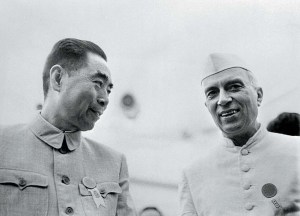China & India Agree To Resolve Differences At BRICS Summit
 China’s President Xi Jinping and Indian Prime Minister Narendra Modi have met at the BRICS summit in Xiamen and agreed to “get relations on the right track”, following the recent stand off of their armies at Doklam, close to the Nathu La pass near Bhutan.
China’s President Xi Jinping and Indian Prime Minister Narendra Modi have met at the BRICS summit in Xiamen and agreed to “get relations on the right track”, following the recent stand off of their armies at Doklam, close to the Nathu La pass near Bhutan.
The BRICS grouping, along with the Shanghai Co-Operation Organisation of which both China and India are members, shows the importance these relatively new institutions are having when it comes to solving regional problems. The China-India border area has long been a contentious issue; however, both Xi and Modi agreed this week “to not allow differences to become disputes” and to have closer communication between the defense and security personnel, so that there is no repeat of incidents such as that at Doklam.
China was also reportedly prepared to work with India to seek guidance from the five principles of the Panchsheel Treaty signed between India and China in 1954. That had been agreed by Chinese Premier Zhou En-Lai and Jawaharlal Nehru (pictured), and outlined the Five Principles of Peaceful Co-existence by which the two nations are bound.
The BRICS nations, including China, named Pakistan based groups such as Lashkar-e-Taiba, Jaish-e-Mohammed, and the Haqqani network as terrorist organisations, a significant move as these groups are reportedly also close to Pakistan’s military, which has strong ties with Beijing.
“China understands it needs India now more than it needs Pakistan”, says Chris Devonshire-Ellis of Dezan Shira & Associates.“Whereas in the past, Beijing used Pakistan to deflect Indian growth and to concentrate India’s military on problems with Pakistan on the Western border, that era has now come to an end. Instead, the CPC needs India to take up the mantle of some of what has previously been Chinese based manufacturing and to become a major supplier to China. Without a sustainable source of inexpensive consumer goods, the Chinese people can become critical of their government. Indian and Vietnamese wages are about 40 percent of those in China, leading many manufacturers to leave and establish operations elsewhere. Only India has the massive workforce able to produce in quantity for the Chinese low end consumer base. This trend has begun, and will continue to develop.”
About Us
Silk Road Briefing is produced and written by Dezan Shira & Associates. The firm provides governments and corporate businesses worldwide with strategic, legal, tax and operational advisory services to their SMEs and MNCs investing throughout Eurasia and has 28 offices across China, India, Russia and the ASEAN nations, and partner firms in Central Asia. We have specific and long term experience in China and the OBOR countries. For assistance with OBOR related issues, please contact the firm at silkroad@dezshira.com or visit the practice at www.dezshira.com
Related Reading:
![]() What China Wants From India – Manufacturing Capacity
What China Wants From India – Manufacturing Capacity
Silk Road and OBOR Business Intelligence
Dezan Shira & Associates´ Silk Road and OBOR investment brochure offers an introduction to the region and an overview of the services provided by the firm. It is Dezan Shira´s mission to guide investors through the Silk Road´s complex regulatory environment and assist with all aspects of establishing, maintaining and growing business operations in the region.
An Introduction to Doing Business in India 2017
An Introduction to Doing Business in India 2017 is designed to introduce the fundamentals of investing in India. As such, this comprehensive guide is ideal not only for businesses looking to enter the Indian market, but also for companies who already have a presence here and want to stay up-to-date with the most recent and relevant policy changes.







